For the past two years, 248 Farmers’ Market (248農學市集) has offered Taipei shoppers a cornucopia of produce grown and harvested using sustainable farming methods. Since opening in July 2008, the market, which started in an East District (東區) lane, has expanded rapidly and now boasts four locations and sells items from 50 farmers.
Founder Yang Ju-men (楊儒門) grew up in a farming village in Changhua County. Once dubbed “the rice bomber” by the media, Yang did prison time for planting rice-filled explosive devices in trains, parks and telephone booths to draw attention to the plight of farmers. Pardoned by then-president Chen Shui-bian (陳水扁) in 2007, Yang has carried on his advocacy work using less incendiary methods.
“We wanted to create a place where farmers and consumers can talk to each other,” Yang says. “If you know how things are grown, then you will be more mindful of the environment.”
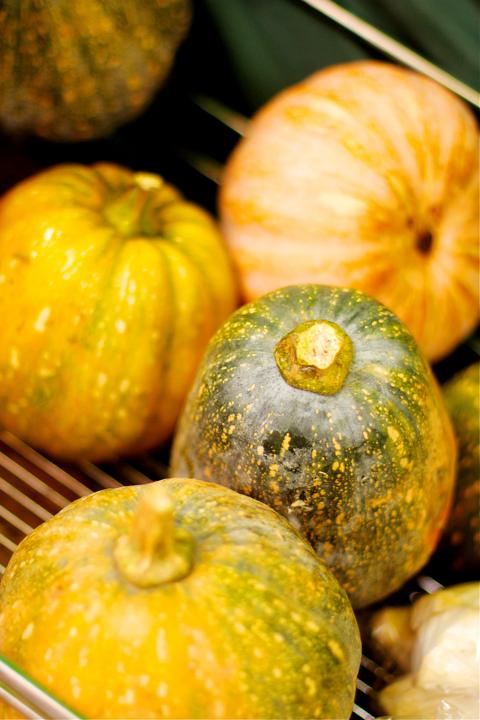
photo: CATHERINE SHU, TAIPEI TIMES
The market is named after its first East District location in Lane 248, Zhongxiao E Road Sec 4 (忠孝東路四段248巷), which is open on Fridays and Saturdays. Another location, called Simple Market (簡單市集), operates in Xinyi District (信義區) on Sundays, while the Tianmu Farmers Garden (天母農學園) is open every day.
GOOD AND UGLY
There are enough groceries at the 248 Market to cook up a banquet. Kuo Chin-yen (郭金燕) sells a rainbow of rice — black, red, brown and red — grown by her brother. The grain is grown without pesticides and Kuo says that the small, irregularly shaped kernels sometimes surprise customers.
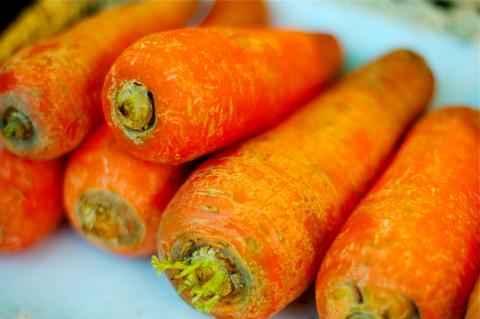
photo: CATHERINE SHU, TAIPEI TIMES
“They say, ‘Oh, they’re so small and ugly!’” Kuo says. “But the texture and taste is great.”
Kuo also sells mulberry vinegar, juice and candies, all made from fruit grown at her childhood home in Yunlin County (雲林縣). Her father was an architect and the land lay unused until Kuo’s friend suggested that she begin cultivating it.
Items from Kuo’s farm aren’t certified organic — the qualification process is too expensive for her tiny business — but she proudly displays a document issued by the Taichung branch of the Taiwan Agricultural Chemicals and Toxic Substances Research Institute (農業藥物毒物試驗所) stating that her farm does not use any chemical pesticides or fertilizers.
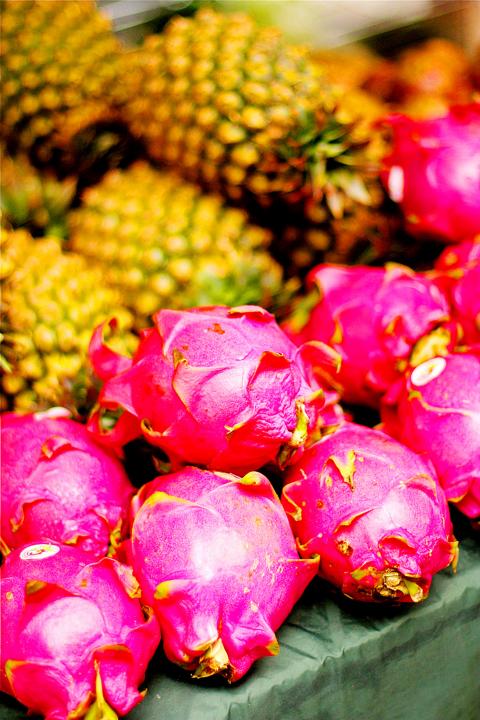
photo: CATHERINE SHU, TAIPEI TIMES
“A lot of the people who shop here are families who want to find safer, cleaner foods,” Kuo says.
Yang says the market’s organizers visit each farm to ensure that growers don’t use chemical pesticides or fertilizers and utilize sustainable farming methods.
ALTERNATIVES
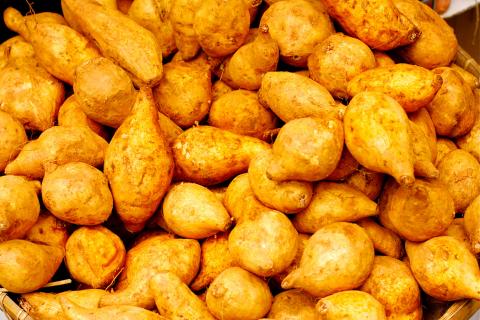
photo: CATHERINE SHU, TAIPEI TIMES
For example, some of the vegetables sold by Fushan Grange (福山農莊, www.eq.org.tw) are grown by farmers who use sour milk for fertilizer and water spiked with black pepper to deter insects.
Fresh produce is not the only food available at 248 Market. Visitors can grab a treat at Midori (蜜朵麗), which sells handmade ice cream. Meanwhile, Manna Food (嗎哪食品行) specializes in pineapple cakes and nougat candy made from ingredients harvested around Taiwan, including sticky rice from Taitung, wheat from Taichung and fruit from Chiayi.
Another company that offers taste buds a trip around the country is Red on Tree (在欉紅, www.redontree.com), which sells fruit jams and chocolate spreads in flavors like Changhua honey and guava and Dahu Township (大湖鄉) strawberry.
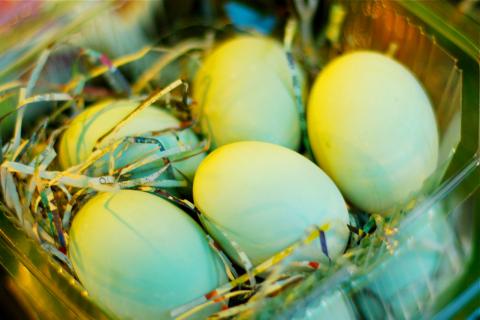
photo: CATHERINE SHU, TAIPEI TIMES
Lee Ming-long (李明隆) displays a colorful assortment of organic-certified fruits and vegetables that were grown by his friends, including squash, yams, dragon fruit, bananas and pineapples.
The introduction of pesticides and other chemicals in farming has altered the flavor of items available in ordinary grocery stores to the point where many people are surprised when they taste organically grown produce for the first time, he says.
“Fruit that is extremely sweet, that’s not normal. It’s not natural. Or honey that is completely clear and smooth. It should have some texture,” Lee says.
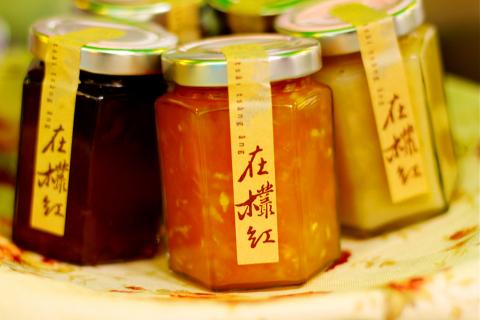
photo: CATHERINE SHU, TAIPEI TIMES
Consumers “might be surprised at the difference in the taste of organic produce at first,” he says, “but they really like it.”

The primaries for this year’s nine-in-one local elections in November began early in this election cycle, starting last autumn. The local press has been full of tales of intrigue, betrayal, infighting and drama going back to the summer of 2024. This is not widely covered in the English-language press, and the nine-in-one elections are not well understood. The nine-in-one elections refer to the nine levels of local governments that go to the ballot, from the neighborhood and village borough chief level on up to the city mayor and county commissioner level. The main focus is on the 22 special municipality

Words of the Year are not just interesting, they are telling. They are language and attitude barometers that measure what a country sees as important. The trending vocabulary around AI last year reveals a stark divergence in what each society notices and responds to the technological shift. For the Anglosphere it’s fatigue. For China it’s ambition. For Taiwan, it’s pragmatic vigilance. In Taiwan’s annual “representative character” vote, “recall” (罷) took the top spot with over 15,000 votes, followed closely by “scam” (詐). While “recall” speaks to the island’s partisan deadlock — a year defined by legislative recall campaigns and a public exhausted

Hsu Pu-liao (許不了) never lived to see the premiere of his most successful film, The Clown and the Swan (小丑與天鵝, 1985). The movie, which starred Hsu, the “Taiwanese Charlie Chaplin,” outgrossed Jackie Chan’s Heart of Dragon (龍的心), earning NT$9.2 million at the local box office. Forty years after its premiere, the film has become the Taiwan Film and Audiovisual Institute’s (TFAI) 100th restoration. “It is the only one of Hsu’s films whose original negative survived,” says director Kevin Chu (朱延平), one of Taiwan’s most commercially successful

In the 2010s, the Communist Party of China (CCP) began cracking down on Christian churches. Media reports said at the time that various versions of Protestant Christianity were likely the fastest growing religions in the People’s Republic of China (PRC). The crackdown was part of a campaign that in turn was part of a larger movement to bring religion under party control. For the Protestant churches, “the government’s aim has been to force all churches into the state-controlled organization,” according to a 2023 article in Christianity Today. That piece was centered on Wang Yi (王怡), the fiery, charismatic pastor of the